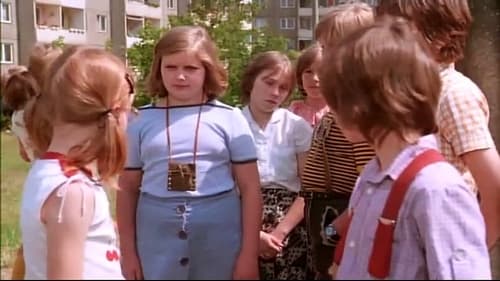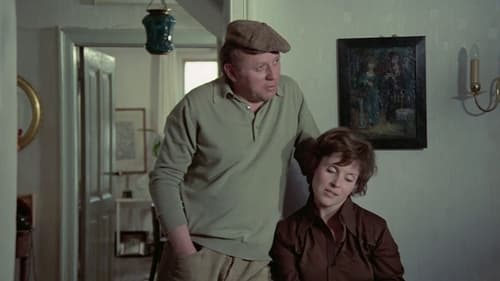Werner Bergmann
Nascimento : 1921-01-24, Niederkaina, Bautzen, Saxony, Germany
Morte : 1990-10-25

Director of Photography

Director of Photography

Self
A documentary about German director Konrad Wolf (1925–1982).

Director of Photography
Film by Roland Oehme.

Director of Photography
1982: East German actor Erwin Gregorek travels to Hamburg to shoot screen tests for a film about the sinking of the ocean-liner Cap Arcona in 1945 - a catastrophe he himself survived as a concentration camp prisoner.

Writer
1982: East German actor Erwin Gregorek travels to Hamburg to shoot screen tests for a film about the sinking of the ocean-liner Cap Arcona in 1945 - a catastrophe he himself survived as a concentration camp prisoner.

Director of Photography
Two girls experience dislike at first sight because of their differences. Then they sort things out.

Writer
Two girls experience dislike at first sight because of their differences. Then they sort things out.

Director
Two girls experience dislike at first sight because of their differences. Then they sort things out.

Director of Photography
35-year old ballet soloist Peter ends his career as a performance dancer and, on the occasion of his last stage performance, looks back on his career and his life. Peter′s retrospection is centred on the relationship with his professional and romantic partner Lotte, who he had once met at a joint performance. Peter remembers the landmarks of their love: their marriage, their child, and Lotte′s severe illness that threatened to end her career. In flashbacks, the film shows how the couple survived this crisis by working sacrificially to return to the stage and celebrate international success.

Writer
Two men and two women in a hotel.

Director
Two men and two women in a hotel.

Director of Photography
A film gala featuring a colorfully mixed program of musical numbers, along with the most popular artists of the GDR music, film and television scenes. The majority of the show is comprised of music performances, which are visually altered or transformed. Cabaret-style written contributions and one acts round out the program. Before each performance, the artists involved are seen in an everyday situation in their life.

Writer
A film gala featuring a colorfully mixed program of musical numbers, along with the most popular artists of the GDR music, film and television scenes. The majority of the show is comprised of music performances, which are visually altered or transformed. Cabaret-style written contributions and one acts round out the program. Before each performance, the artists involved are seen in an everyday situation in their life.

Director of Photography
In a Russian POW camp, four Germans determined to end WWII agree to pose as Red Army soldiers. Are they patriots or traitors, heroes or opportunists? Although they go to the frontlines, their new Russian comrades are initially unsure whether to trust them. Three of them then accept a mission behind German lines, but they are unprepared to fire upon their countrymen and it ends up costing the life of a Russian soldier. In the meantime, the fourth man has fallen in love with Russian radio operator Svetlana. After being criticized by the other Russians, he too agrees to participate in the mission..

Director of Photography
This episodic comedy explores love in all its varieties.

Director of Photography
In this film, Wolf and scriptwriter Wolfgang Kohlhaase explore the role of art and the artist in socialist society. A sculptor questions the reception and value of his work, in a delicately nuanced narrative interweaving personal memories, historical dilemmas, and political defeats.

Director of Photography
World-famous geneticist Professor Hülsenbeck is a man of integrity who refuses to mix science and political gain. When his findings are being used to harm humanity, he immigrates to the USA in 1933 in protest against Nazi racial politics.

Director of Photography
A socialist story of "atoms for peace" and compulsory labor in an East German uranium mine under Soviet control.

Director of Photography
As a painter in the court of King Carlos IV, Goya has attained wealth and reputation. He believes in King and Church, yet he is also a Spaniard who dearly loves his people. This contradiction presents him with a dilemma.

Director of Photography
Gregor is a young soldier entering Germany with the victorious Soviet troops at the end of WWII. But he is also the child of left-wing Germans who fled from Hitler and spent the war in the Soviet Union. As a result, his return to Germany is ambivalent; he finds he is a stranger in his own land. As they enter Germany, Gregor begins to realize that he is different from all his comrades in arms, for this defeated land is his home country, the Germans he meets are his compatriots. He is a victor, but also one of the vanquished. He attempts to understand the Germans he meets along his way, but he is a 19-year-old: inquisitive, occasionally uncomprehending and repeatedly dismayed by the atrocities and lies he encounters.

Director of Photography
Test film for a 70mm film stock produced in East Germany.

Writer
Test film for a 70mm film stock produced in East Germany.

Director
Test film for a 70mm film stock produced in East Germany.

Director of Photography
GDR anti-Vietnam propaganda film with footage of East Germans donating blood to be sent to the Viet Cong soldiers.

Director of Photography
The plot takes place in a picturesque Montenegrin islet of Sveti Stefan. The local authorities investigate the murder of a tourist, which background turns out to be connected with the Nazi crimes.

Director of Photography
After a breakdown, Rita returns to her childhood village in 1961. As she recovers, she remembers the past two years: her love for the chemist Manfred, ten years her senior; how his enthusiasm about his new chemical process turned to bitter disappointment in the face of official rejection; how he escaped to West Berlin a few weeks before the Wall was built and hoped that she would follow him …

Director of Photography
GDR border guard Gunter Rist is a young man from humble homes. During a swimming competition he meets Penny, a professor’s daughter from a good family, and they fall in love. However, their different social backgrounds get in the way of their happiness: Penny’s friends make it obvious that they are not willing to accept Gunter in their group. Although Penny takes Gunter’s side, she doubts if love can overcome all obstacles. In this state, she falls for the advances of her ex-boyfriend Bob and joins him on vacation. In the meantime, Gunter has an accident and is hospitalized. In the hospital, he meets the nurse Li who seems to be perfect for him.

Director of Photography
Professor Hans Mamlock is the distinguished chief of surgery in a university hospital. The year is 1933, and although the Professor is Jewish, he remains unconcerned with politics and the growing Nazi threat. Mamlock identifies strongly as a German, and he believes his culture to be simply incapable of the common barbarism associated with the Nazi party. Accordingly, he shows little understanding for people with strong or unpopular political views, such as Walter, a patient, and Rolf, his own son. Indeed, when Rolf joins the communists in resisting the Nazis, Mamlock throws him out of his house. As the persecution of Jews intensifies during the 1930s, Mamlock's own daughter is targeted for anti-Semitic attacks at her school...

Director of Photography
This film continues the story of radio operator Ludwig Bartuschek from “The Sailor’s Song”. Near the end of the Weimar Republic, Bartuschek (Erwin Geschonneck) is working as a mechanic in the Sperber airplane plant. Director Dehringer offers him the opportunity to train as an airplane constructor if he is willing to give up his communist beliefs under oath. Bartuschek will not allow himself to be bought and instead joins the underground resistance movement.

Director of Photography
Stationed in a secluded Bulgarian village in 1943, Walter - a German Wehrmacht sergeant and artist - lives in almost idyllic distance from the war. Then a transit camp is set up for Jews arriving from Greece. When Ruth, one of the internees, asks Walter to help a pregnant woman, the two form an unlikely bond.

Director of Photography

Director

Director of Photography
Berlin, early 1930s. Lissy, a young woman raised in a socialist working-class family, marries a clerk who promises her a better life. During the depression, however, he gets fired and can’t find a new job. Desperate for companionship and money, he falls for Nazi propaganda and joins the Storm Troopers. Lissy's brother, who for a time sympathized with the communists, now also wears the SA uniform. When he is killed by the Nazis—because of hisoppositional ideas—Lissy starts questioning things and makes a difficult and potentially dangerous decision.

Director of Photography
Albert Hauptmann is an out of work waiter in Cologne who is often confused with a former Captain of the Nazi Army. Albert uses this to his advantage and becomes the Director of the Montan Corporation, and a member of the West German Parliament. Herr Karjanke, the real Captain, learns of Albert’s ruse, and wants to claim his "rightful" position in Parliament. But Karjanke cannot come forward until his politicking "Doppelganger" succeeds in passing an amnesty law for war criminals. When Albert is finally brought before a judge on charges of fraud, he learns that this own amnesty law does not apply to him.

Director of Photography
The authorities expect the case of Friedel Walter, alias "Dr. Mueller," to be a straightforward one: he was working as a doctor without proper credentials under a false name. But Mehlin, the man in charge of his case, knows that there is more to the story. When he was injured fleeing from a concentration camp, resistance worker Irene asked her medical student boyfriend Walter to give him medical care.

Director of Photography
Actually, the Düsseldorf musician and composer Peter Weselin only wanted to spend his placid vacation with his uncle in the Vogtland village of Klingenthal. But in the city famous for its manufacture of musical instruments, the annual music festival is about to start. For the festival, the accordion factory asks Peter for a large composition for the symphonic orchestra. Furthermore, cute Anna asks him to write a pop song for her youth dance band. Thus, Peter finds no rest during his vacation.

Director of Photography
Two boys from West Berlin, Klaus and Max, live in poverty. They dream of a career in boxing and save every penny in order to buy boxing gloves for training. Nevertheless, they cannot seem to save enough and so they let themselves be hired by the bartender Klott for a twisted scheme. However, Klaus overhears one of Klott's conversations and learns that Klott intends for the boys to steal horses from the East Berlin Barlay Circus, where Klaus recently made some good friends. Indignant, he sets out to stop the robbery—and an adventurous action story results.

Director of Photography

Cinematography
The economic and cultural improvements of the Soviet Occupied Sector are documented with scenes from the years 1945 to 1950. The film deals with the land reform, the founding of the Socialist Unity Party, the expropriation of war criminals, the founding of the GDR and the first Five Year Plan in July 1950. Special attention is dedicated to the setup of the steel industry. All this is shown in contrast to the new Federal Republic of Germany, where unemployment, slums and the West Berlin airlift prevail. The Cold War of those years is reflected in the film as well as a part of the development of post-war Germany.


























